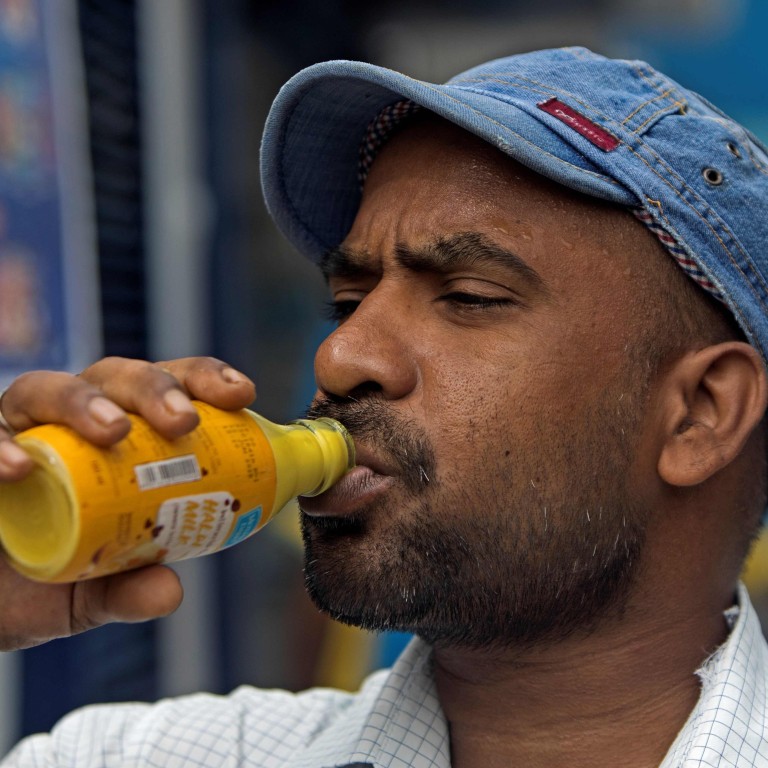
As India records 8 million coronavirus cases, demand for home remedies is booming
- The rising interest in ayurveda and other therapies has been encouraged by Prime Minister Narendra Modi’s Hindu nationalist party
- Experts believe that, because of under-testing and under-reporting, the number of cases and deaths is much higher than officially reported
New Delhi housewife Sashi scoops Covid-19 “immunity-boosting” powder into a jug of water every morning for her family, joining a growing number of Indians who believe traditional supplements will help ward off the pandemic.
“I thought that since it’s been on TV, it must be good,” she said.
The pandemic has increased nervousness about the fragile state of India’s health care system.
Experts believe that, because of under-testing and under-reporting, the number of cases and deaths is much higher than officially reported.
There is no scientific evidence that ayurvedic treatments can prevent the coronavirus. But the sector had already been massive before the pandemic, with people believing claims that natural remedies can cure everything from cancer to the common cold. It is now worth US$10 billion a year, according to the Confederation of Indian Industry.
Ayurveda practitioner Bhaswati Bhattacharya said the lack of a coronavirus vaccine and other conventional treatments has driven the rush towards familiar natural remedies.
“Ayurveda has been written for 5,000 years and been around probably for twice that at least. It’s lived through plagues, smallpox and pandemics, so people are saying, ‘Let’s see if it works’,” she said.
In January, the Ministry of AYUSH (Ayurveda, Yoga & Naturopathy, Unani, Siddha, Sowa Rigpa and Homeopathy) touted traditional remedies as a means to combat the coronavirus.
More recently, Health Minister Harsh Vardhan released guidelines for treating some asymptomatic and mild Covid-19 sufferers with ayurveda and yoga.
‘To hell with this corona’: the mask slips for India’s Covid-19 sceptics
At chemist shops, ayurveda products are displayed as prominently as pharmaceutical drugs.
Mother Dairy, a leading milk producer, said there has been a “phenomenal” consumer response to its recently launched turmeric milk for children.
“The demand is very, very high so we are ramping up the production and distribution,” Mother Dairy’s products chief Sanjay Sharma said. “Health and immunity-led products are a new phenomena. This is an opportunity … to provide precautionary health care for consumers at a very affordable price.”
Philipe Haydon, chief executive of Himalaya Drug Company – a major producer of herbal pills and creams – said demand for wellness and immunity products was up to 10 times higher than before the pandemic. But the hungry for alternative treatments has also fuelled controversial and pseudoscientific claims to have found Covid-19 “cures”.
Although there is no scientific evidence, several politicians from Modi’s Bharatiya Janata Party have advocated using cow dung and urine to cure the virus.
And in June, the AYUSH ministry ordered yoga guru Ramdev, who has turned his Patanjali company into one of India’s best-known brands, to stop marketing his “Coronil” herbal remedy as a cure.
The Indian Medical Association has also called on the health minister, himself a doctor, to provide evidence that ayurveda and yoga are effective in treating the virus.
“None of them provide any specific protection against Covid-19,” said Anand Krishnan, a community medicine professor at the All India Institute of Medical Sciences in New Delhi. “It is more important for people to follow the measures of social distancing, masking and handwashing.”
“All states need to be careful during the coming festive season. This caution must be exercised for the next three months at least,” Health Minister Harsh Vardhan said in a recent statement.
Millions of Indians ignore Covid-19 rules to vote in Bihar state poll
A stringent lockdown imposed in March has gradually been eased as the government seeks to reboot the economy after the loss of millions of jobs nationwide. But experts say this has helped spread Covid-19.
New Delhi recorded 5,000 new cases on Wednesday, its highest daily figure since the outbreak of the pandemic. Officials have warned that the capital could see more than 10,000 cases a day in the next wave.

Randeep Guleria, director of the All India Institute of Medical Sciences, told The Times of India newspaper that if cases continued surging the country’s fragile health care system “will get really stressed.”
Experts have said crowds gathering for Diwali and other festivals, colder temperatures and the annual winter pollution crisis could worsen the impact of coronavirus cases in Delhi.
Indians seek ancient ayurvedic home remedies to boost immunity
Authorities are also worried about the southern state of Kerala and West Bengal in the east which have seen worrying spikes in cases.
Financial capital Mumbai, India’s worst-hit city with more than 250,000 cases and over 10,000 deaths, is currently adding about 2,000 cases a day.

.png?itok=arIb17P0)